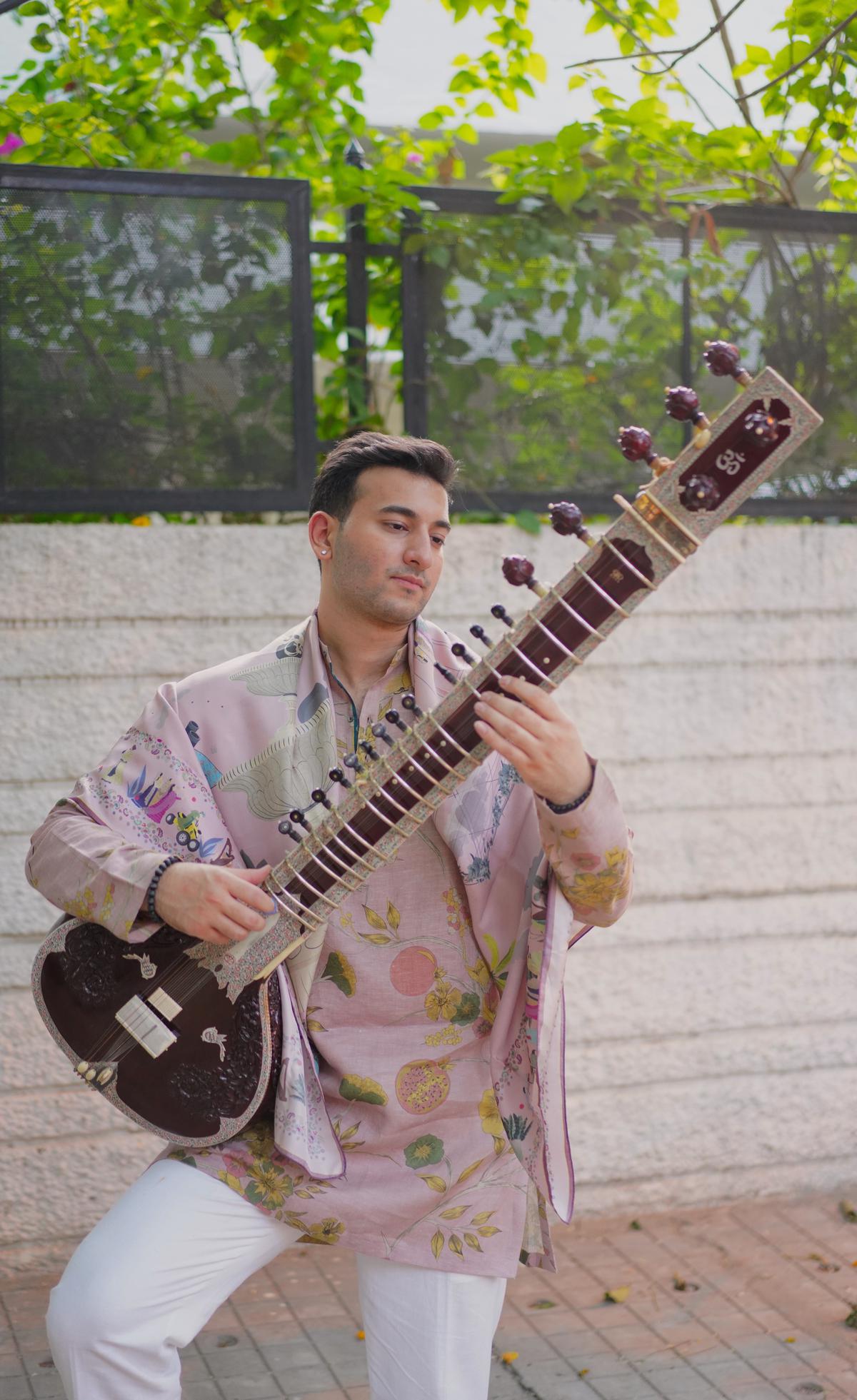Rishab Rikhiram Sharma’s ‘Sitar for Mental Health’ music series offers an immersive experience to the audience


Rishab’s mehendi is a powerful statement challenging gender norms.
| Photo Credit: Special arrangement
Hailing from a lineage of luthiers and mentored by the legendary Pandit Ravi Shankar, Rishab Rikhiram Sharma effortlessly mastered the sitar. His journey took a unique turn as he started integrating mental health advocacy into his performances. After touring across the United States and Canada, the New York-based 26-year-old is in India on a multi-city tour showcasing the ‘Sitar For Mental Health’ music series. After covering cities like Chennai, Jaipur, Goa AND mUMBAI, Rishab is set to travel to New Delhi, Bengaluru, Hyderabad, Pune, Ahmedabad, Kolkata, and Chandigarh across a span of three months beginning on March 15, 2024.
“I’ve found that music has a unique power to connect people emotionally and spark important conversations, so I’m using my identity as a musician to facilitate those discussions. My goal is to create a space where people feel comfortable opening up about their struggles and seeking support if needed, while experiencing the beauty and healing power of music,” says Rishab who drew upon personal experience during the COVID-19 pandemic when he faced challenges with mental health, to develop a method of using Indian classical music to promote mental wellbeing. His journey of seeking therapy and experiencing its positive impact made him adopt an approach that suited his concerts.
Music matters

Incorporating his personal style into his attire, Rishab breaks away from traditional expectations from a classical musician.
| Photo Credit:
Special arrangement
How do the music and the mind synchronise? Rishab explains: “I’ve been incorporating elements of mindfulness and introspection into my sitar performances. I create a serene atmosphere, inviting the audience to immerse themselves in the music and the present moment. Then, as I play, I weave in themes of resilience, healing, and inner peace through the melodies. Additionally, I take breaks during the performance to speak about mental health, sharing personal experiences and insights. I talk about the importance of seeking help, breaking the stigma surrounding mental illness, and practising self-care.”
Rishab’s transition from India to the US happened gradually over time, largely influenced by his father’s frequent visits to the US for lectures on Indian classical music and musical instrument demonstrations. Rishab often accompanied his father during these trips, participating in demonstrations on the sitar and other instruments. His exposure to the US from a young age made the cultural shift less daunting for him.
Being a luthier
Given that his father’s clientele was primarily in the US and Canada, to expand their musical instrument business, they decided to set up a shop in New York under the name as his father, Sanjay Rikhiram Sharma. They also established a school there. As Rishab pursued his college education at Queens College, City University of New York, majoring in production and economics, he also immersed himself in the diverse musical landscape of New York City. “This exposure enriched my musical experiences and provided me with opportunities to record various musical genres, from wind quartets to Jewish bands, and to work as a studio engineer and teaching assistant under my professor.”
Rishab agrees that having expertise in both music and luthiery can indeed provide a unique advantage in mastering an instrument. “Understanding the intricacies of how an instrument is crafted and how its components interact can deepen one’s comprehension of its capabilities and limitations. This knowledge can directly translate into producing the best possible sound for various musical applications,” he says.
Magic of mehendi
The audience at his concerts cannot miss the beautiful and intricate pattern of mehendi adorning his hands. It adds beauty to the show while also challenging gender norms. “My mehendi application is inspired by Mughal paintings. I usually apply two days before my performance. In mehendi, I found a middle ground between cultural expression and the permanence of tattoos. It allows me to explore different designs for various occasions without the long-term commitment associated with tattoos. I design my kurtas, again, with a desire to break the monotonous dressing by the classical musicians,” he laughs.
Recalling his association with Ravi Shankar, who was close to his family, Rishab says, “I began learning from him at the age of 11 and spent two intensive years under his tutelage. Guruji, as we affectionately called him, had a unique routine of dividing his time between the US and India, spending six months in each place. Whenever he was in town, it felt like a festival every day, with people bringing sweets and gifts to honour him. Despite his immense musical stature, Guruji had a warm and humorous personality. He would share jokes, both veg and non-veg, creating fun moments amidst the seriousness of our musical pursuits.”
As for the rest of his tour, Rishab says, “Rest assured, it will be an intriguing and memorable event. We’re finalising the details before announcing the tickets, but I promise it will be a beautiful experience for all involved.”
The tour is open to the public, with tickets available through Zomato Live. The logistics include various shows, ranging from intimate gatherings with around 150 people to larger events accommodating up to 1800 attendees. Ticket prices are kept affordable, with options starting as low as ₹300.
Schedule in India
March 15: Ahmedabad
March 17 Pune
March 21: Kolkata
March 24: Chandigarh
March 31: Bangalore
April 7: Delhi
April 14: Hyderabad

